Canada Lifts COVID-19 Entry Restrictions; U.S. Travel Urges Biden Administration to Follow Suit

Effective Oct. 1, it became easier for international travelers to go to Canada, including those attending events, as the country officially removed all COVID-19 entry requirements as well as testing, quarantine and isolation measures for arriving visitors. Other COVID-19 travel restrictions were also dropped throughout the country.
According to Canada’s Public Health Agency, the removal of the measures, which include its COVID-19 vaccine mandate, was prompted by several factors. Included in the list is modeling that indicates Canada has largely passed the peak of the recent wave fueled by Omicron BA.4 and BA.5 variants, Canada’s high vaccination rates, lower hospitalization and death rates, and the availability and use of vaccine boosters (including new bivalent formulation), rapid tests and treatments.
“Canada’s travel measures successfully mitigated the full impact of COVID-19 for travelers and workers in the transportation sector and helped keep communities safe,” said the Honorable Omar Alghabra, Canada’s minister of transport. “Thanks to Canadians who rolled up their sleeves and got vaccinated, we are able to take this great step towards easing measures and returning to normal.”
U.S. Reaction
The U.S. Travel Association, which has been persistently calling on the Biden administration to fully ease COVID-related travel restrictions to ensure overall economic growth and the continued recovery of all U.S. travel sectors, applauded Canada’s decision.
[The Canadian government] is taking the right step by lifting its vaccine and testing requirement to enter Canada, which will give its economy a substantial boost,” said Tori Emerson Barnes, U.S. Travel’s executive vice president of public affairs and policy. “[The U.S. government] should follow suit by immediately suspending proof of vaccination for qualified visitors from Canada and other nations, given the wide access to effective COVID boosters and therapies.”
Emerson Barnes added that Canada is the No. 1 source of international travelers to the U.S.
“We should take every action to accelerate recovery from this vital market,” she said.
Canada’s Policy in Detail
Under Canada’s new rules, all incoming travelers, regardless of citizenship, no longer have to do the following:
- Submit public health information through the ArriveCAN app or website
- Provide proof of COVID-19 vaccination
- Undergo pre- or on-arrival COVID-19 testing
- Carry out COVID-19-related quarantine or isolation
- Monitor and report if they develop signs or symptoms of COVID-19 upon arriving to Canada
Transport Canada also removed existing travel requirements. Effective Oct. 1, travelers are no longer required to undergo health checks for travel by air and rail or wear masks on planes and trains.
Although the masking requirement is being lifted, Canada’s Public Health Agency strongly recommends that all travelers wear high-quality, well-fitted masks during their trips.
Cruise measures were also removed, so travelers will no longer be required to have pre-board tests, be vaccinated or use ArriveCAN to submit health information. A set of guidelines will remain to protect passengers and crew, which will align with the approach used in the U.S.
The agency also suggests that people should not travel if they have symptoms of COVID-19. If an individual becomes sick while traveling and is still sick when they arrive in Canada, the agency recommends that they inform a flight attendant, cruise staff member or border services officer. They may be referred to a quarantine officer, who will decide if they need further medical assessment, as COVID-19 remains one of communicable diseases listed in the country’s Quarantine Act.
Don’t miss any event-related news: Sign up for our weekly e-newsletter HERE, listen to our latest podcast HERE and engage with us on Twitter, Facebook and LinkedIn!


Add new comment